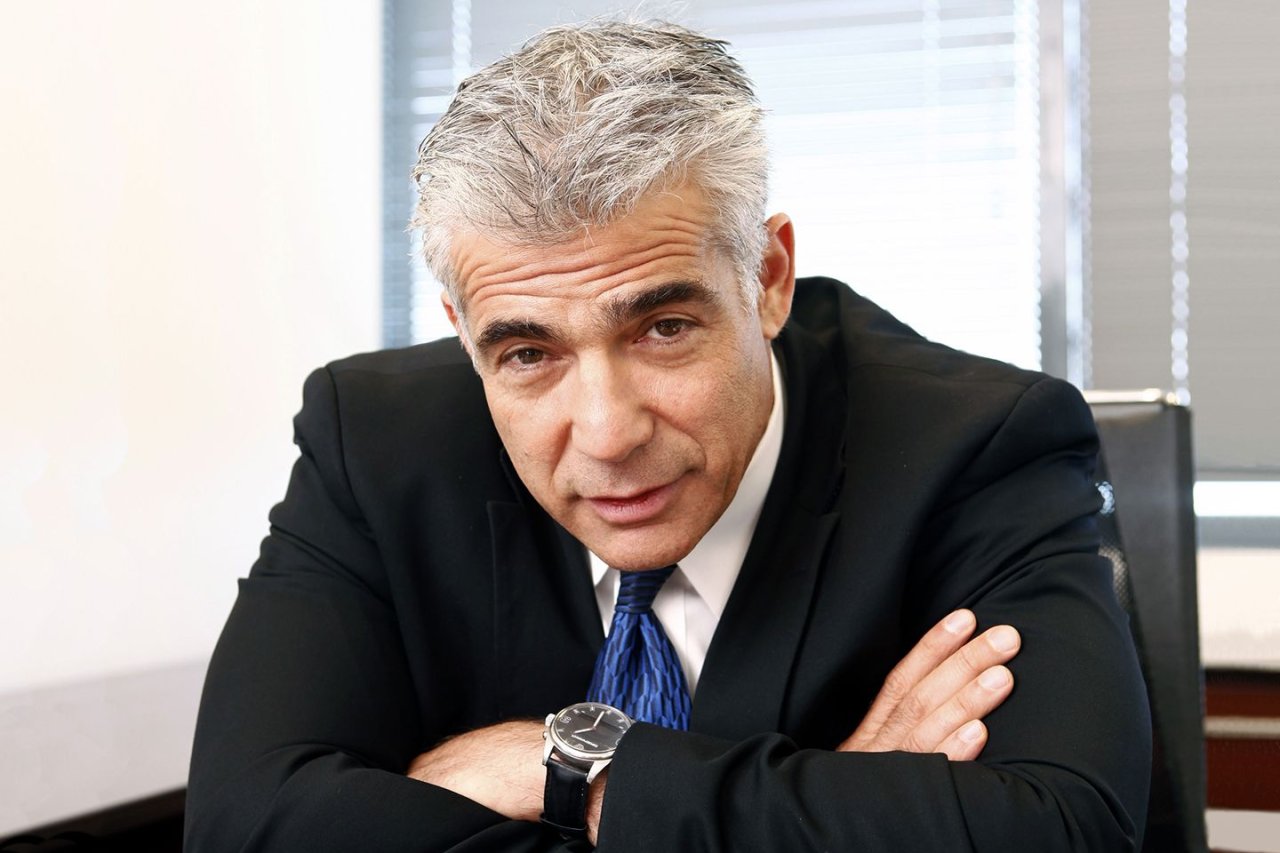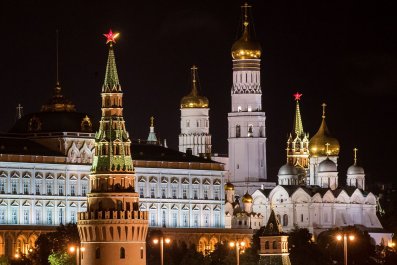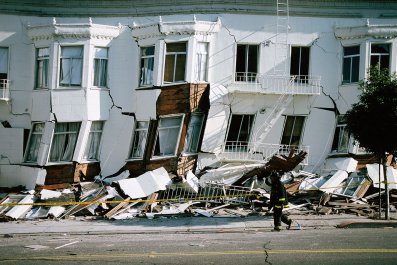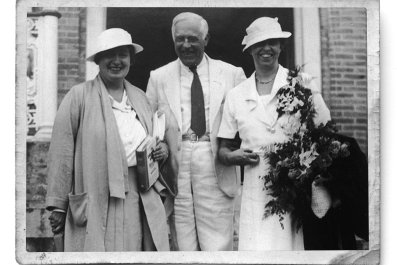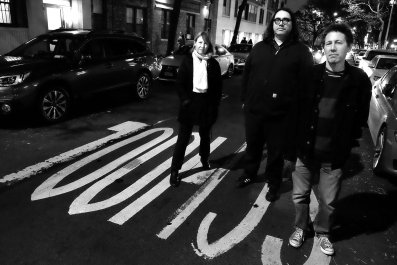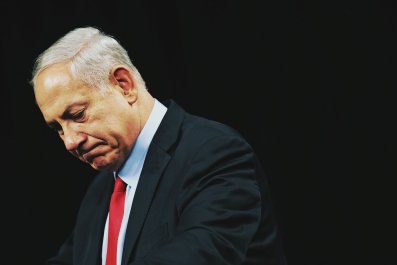Three years ago, Yair Lapid was a centrist Israeli politician working as Benjamin Netanyahu's finance minister. Today, he is a key witness in the corruption probe dogging the prime minister.
He's also Netanyahu's chief rival in the 2019 elections. If they were held tomorrow, pollsters say, Lapid's centrist party, Yesh Atid—which translates from Hebrew as "There is a future"—could win several more seats than Netanyahu's right-wing Likud Party, though Lapid would have to form a coalition from within a weak and crowded opposition.
Then again, Netanyahu is under significant pressure. On February 13, the Israeli police recommended the country's attorney general indict him on charges of bribery, fraud and breach of trust. The same evening, Lapid confirmed Israeli press reports that he had been crucial to that explosive recommendation. He served as a key witness in one of the four bribery probes involving Netanyahu. In that case, prosecutors allege that Netanyahu tried to push a law through Lapid's Finance Ministry that would have provided tax breaks to a billionaire associate—Hollywood mogul Arnon Milchan—who had given the Netanyahu family some 750,000 shekels ($218,000) in lavish gifts. (Lapid says he refused to pass the law, despite pressure from Netanyahu.)
"Like any law-abiding citizen who is asked by the police to help them get to the truth, I went and answered all their questions," Lapid said in a statement on February 14. He described it as a "sad day" when an Israeli leader is accused of criminal offenses, and he has publicly called for Bibi to step aside.
Netanyahu's allies have responded angrily, calling Lapid a "snitch," while the Israeli leader has tried to appear steadfast, saying he will not resign.
As the scandal widened, Newsweek spoke with Lapid in Tel Aviv about his vision for the country and his bid to end the longest single term of any prime minister in Israeli history.
Do you represent a true change from Benjamin Netanyahu?
When you've been in politics for this long, you are first and foremost a politician. What we are offering is a real alternative to that. [Unlike Netanyahu], I truly believe we need to make progress with the Palestinians. I believe in the two-state solution, but in bringing it about cautiously.
How do you propose to do that?
In order to be super strong, we need to separate from the Palestinians. Our attempt to run the lives of 2.9 million Palestinians in the West Bank and another 2 million in Gaza is not strengthening the country; it weakens it. We will find a strong, secure way of separating ourselves from them. I want this to be a democratic and Jewish state. A binational state will not be either.
Do you think that Israel has become more right wing and nationalist in recent years?
A majority of Israelis still support the two-state solution. There is a group in our society that tells people, "The game is over. There are too many settlers out there. There will be no Palestinian state." But not only are they wrong, the majority of Israelis feel that they are wrong. We can have a two-state solution, and I truly believe this is the only solution.
What about the future of Jerusalem?
On Jerusalem, there will be no compromise.
Israeli leaders, including Netanyahu, have traditionally come from a military background. You don't. How will you make up for that with voters?
I am surrounded by security people. It is not about a question of what kind of soldier you were in your 20s. It's about the quality of decision-making.
Israel has been criticized for deporting migrants from Africa. Given the history of the Jewish people, do you think this criticism is valid?
I remember even in Britain [where Lapid spent part of his childhood] they used to ask me, "Why did you come here? You should not stay. You know we need the jobs for our people, not for some immigrants." When people migrate in order to get a job, it is OK to say, "Sorry, we don't want you here."
There is a widely accepted humanitarian crisis in Gaza. How would you deal with that?
In 2005, Israel did what the world asked it to in Gaza. We dismantled the settlements, the army left, and they built terror tunnels, and up until this moment have fired approximately 15,000 rockets over Israeli citizens.
But critics would argue that Egypt and Israel restrict land and sea access to the strip?
They only need to do one thing for the blockade to be lifted: stop firing at people.
What is your position on Israeli settlements in the West Bank?
The big blocs are going to remain part of Israel; there are very few Palestinians in any of them, and they are close to our border. A vast majority of people there are Jews. Now, even in bilateral discussions like [former Israeli Prime Minister] Ehud Olmert had with Abu Mazen [Mahmoud Abbas, the Palestinian president], there was an understanding that the big blocs are going to remain part of Israel.
So you do not believe in a Palestinian state on the 1967 borders?
There is no way back. But there will be territory swaps. There will be solutions. This is part of my problem with the Palestinians. They are saying this is a zero-sum game. This is, to me, living proof that they don't want an agreement.
Do you agree there are separate forms of law in the West Bank for Arabs and Jews, and would you change that?
Give me the name of another army who sends to jail a soldier, like we recently did, just because he shot a terrorist.
Some people compare the system to apartheid in South Africa. What do you say to that?
This is so ridiculous that I don't even know where to start answering. You know what, an Arab Supreme Court justice sent the prime minister to jail a few years back [Olmert in 2014]. Can you imagine? There was an Arab Knesset member who was sitting next to us in this coffee place just now.
Is there a partner for peace?
Enemies make peace, not partners.
Will there be elections this year, and will you win them?
I'm not guessing. This is your job.
What do you want your legacy to be?
I want to be the guy who made it possible for Israel to live without the constant shadow of the conflict.



